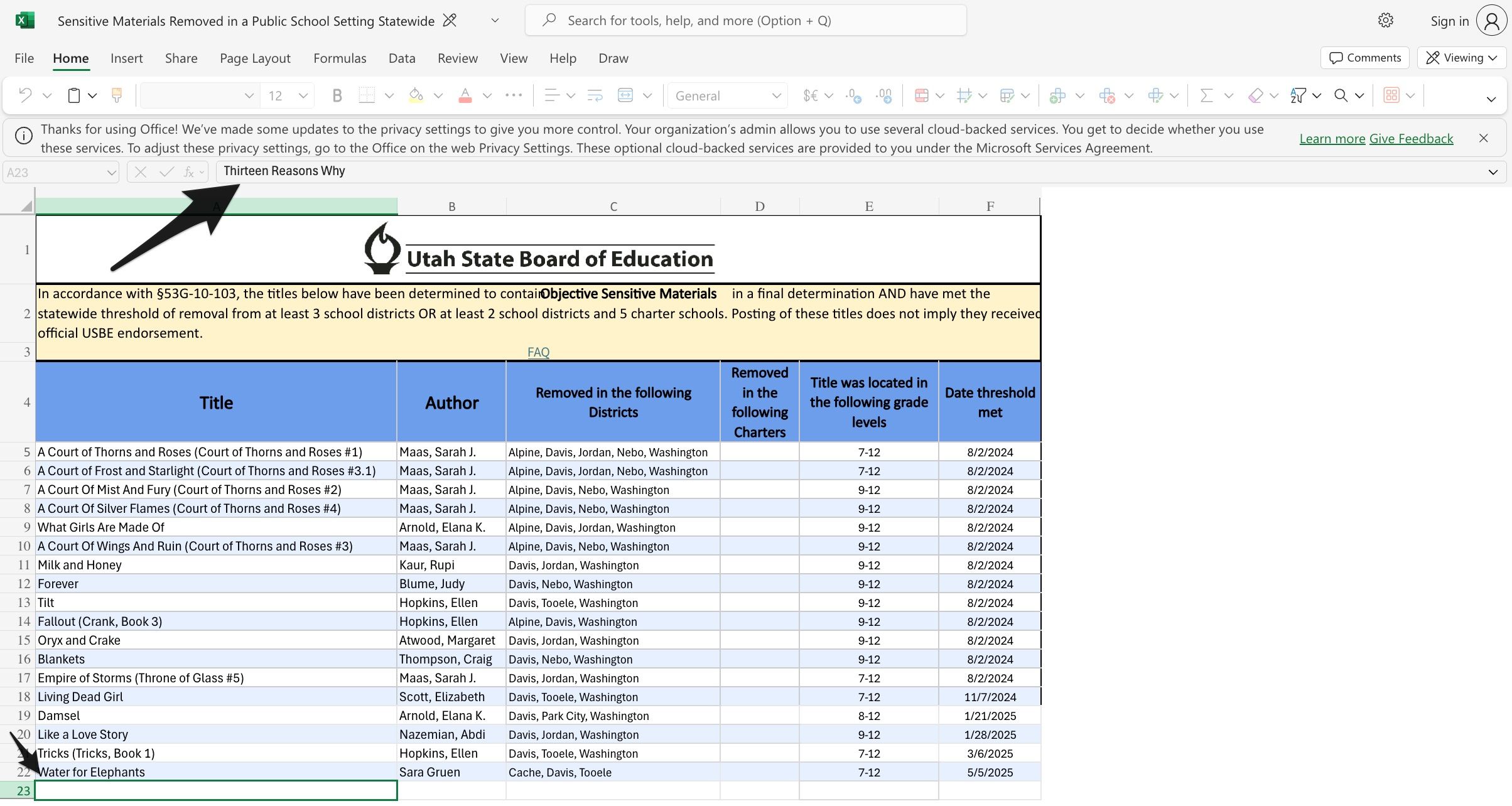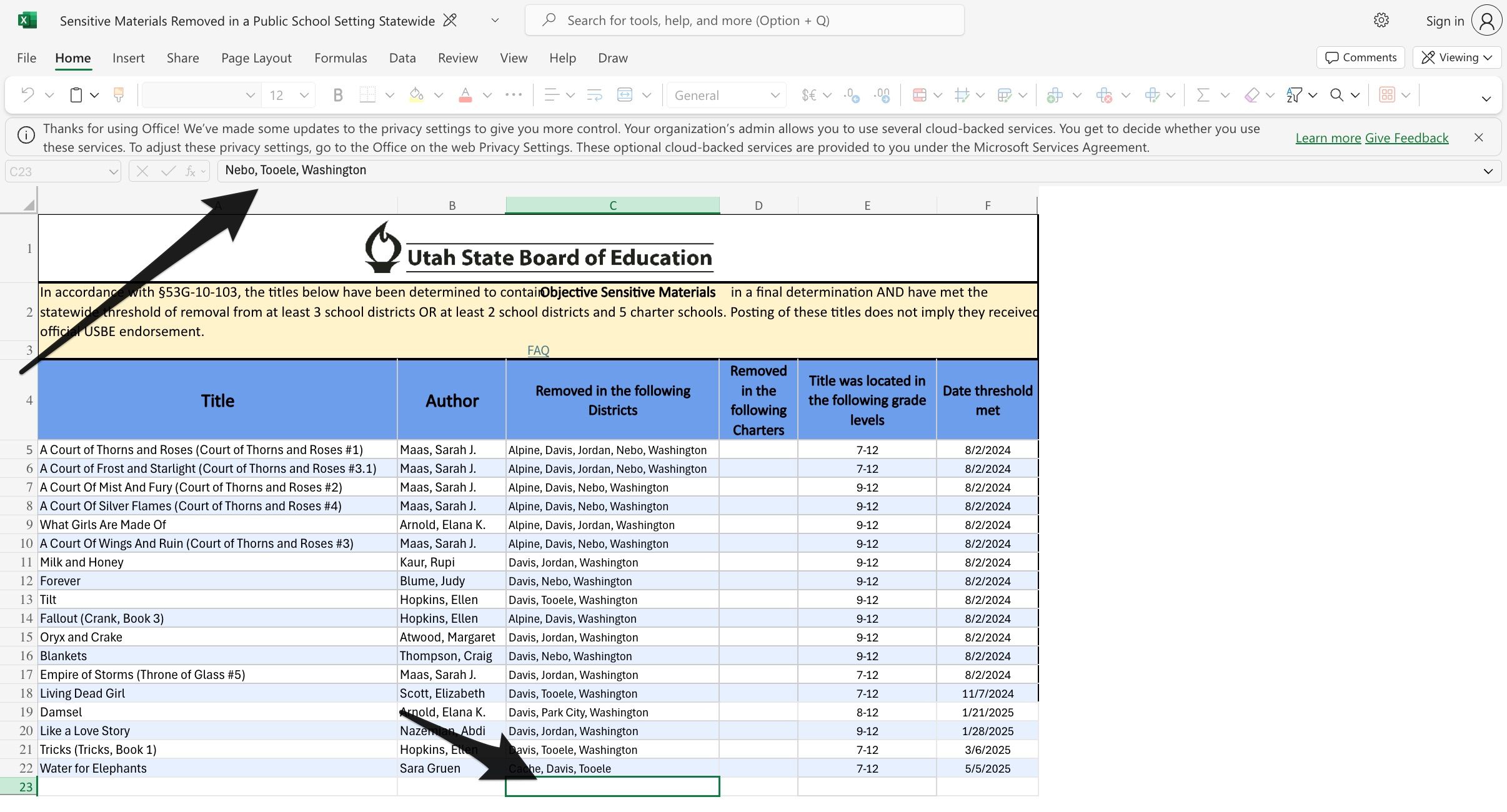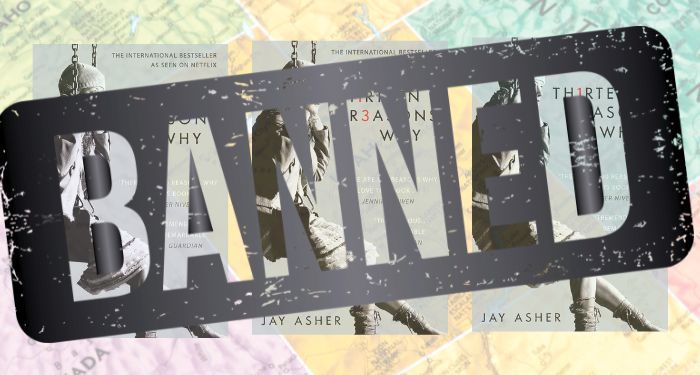970x125
This content contains affiliate links. When you buy through these links, we may earn an affiliate commission.
Yesterday, October 23, 2025, the state of Utah quietly added yet another book to its list of titles that must be removed from all public schools. Jay Asher’s bestselling young adult novel turned Netflix show Thirteen Reasons Why was added to the list following bans in Nebo, Toole, and Washington school districts.
The book’s addition to the list was quiet, as its currently listed in white font that is unreadable without clicking directly on the spreadsheet cell.



Utah passed one of the strictest bills related to books in public schools last year. House Bill 29 (HB 29) allows parents to challenge books they deem “sensitive material” and it also outright bans books from all public schools in the state if those books have been deemed “objective sensitive material” or “pornographic” per state code in at least three public school districts or two public school districts and five charter schools statewide. The bill went into effect July 1, 2024, and it started with 13 titles on it.
The bill is retroactive, meaning that titles which met the state’s guidelines prior to the bill’s start date were included on the list. Per HB 29, any time a public or charter school removes a book deemed “sensitive material,” they must notify the State Board of Education. If that book meets the threshold of removals, all schools will be notified and expected to dispose of it.
Literary Activism
News you can use plus tips and tools for the fight against censorship and other bookish activism!
There are now 19 books prohibited in any Utah public school. Of them, 16 are written by women, and their average publication date is 2011. This means that most of these books have been on shelves and available for many years and caused no issues until this manufactured crisis. The list is as follows:
What is important to understand about the law is that despite claims this is about “local control,” schools in the state are forced to follow the decisions made in other districts. There are 42 public school districts in Utah, but two districts account for nearly 80% of the books banned statewide: Davis School District and Washington School District. As noted above, Washington School District contributed to the ban on Asher’s title.
It is perhaps noteworthy that Davis School District is not one of the districts to ban Thirteen Reasons Why. It is the only book banned statewide so far that Davis did not ban.
In January 2025, Utah’s State Board of Education also further clarified the law as it applies to students. No students were allowed to bring their own personal or public library copies of any of the state’s banned books onto school campuses. Student freedom to even carry these books to class for their own free reading was deemed against the law, and the state issued guidance for how local educational agencies could approach students who brought any of the above 18 books to school.
This provision of the law was changed in July following pushback from First Amendment and Freedom of Expression organizations. Students can now bring their own copies of those books onto school campuses.
We’re going to continue to see more books added to this list in Utah as the school year carries on. Whether or not we’ll hear about them without needing to do some detective work as in the case of the statewide ban of Thirteen Reasons Why via the state’s own database of said book bans remains to be seen.
These are not, of course, the only books being banned in the state where book bans are happening, despite claims by the federal Department of Education. Individual school districts are allowed to ban any books they deem inappropriate–which, of course, helps add more titles to the state list as only three districts need to remove a book before the book must be removed everywhere.
Utah is not the only state with such a book list. South Carolina also retains a sanctioned list of books that must be removed in every public school district. Their list contains 21 titles, making them the most censorious state when it comes to state-sanctioned book bans. While Tennessee has the legal mechanisms for creating statewide school book bans, it has yet to add any titles to a list. Florida officials have also distributed a list of books the state deems inappropriate and necessary to be removed from school libraries, though theirs is not codified into law like in the other three states.
These laws do not apply to private or homeschool institutions. That’s intentional.
Book bans in Utah are coming in waves, so anticipate more titles to be added to the list in the coming weeks, especially as the state works its way backwards from the date of the law’s implementation.



